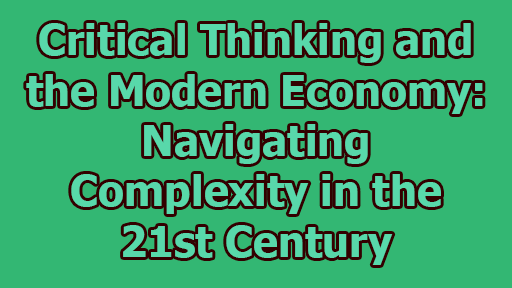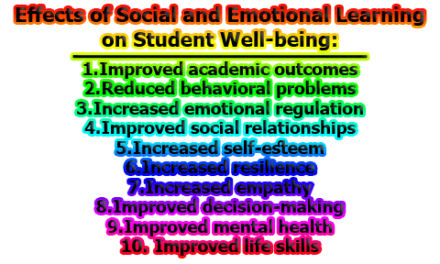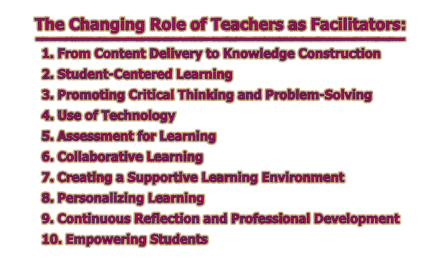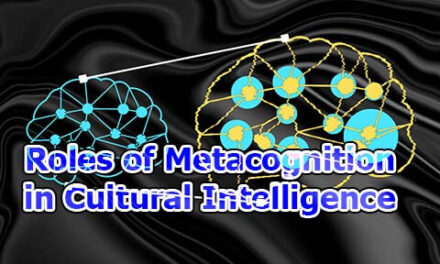Critical Thinking and the Modern Economy: Navigating Complexity in the 21st Century
In the 21st century, the global economy is characterized by unprecedented complexity, rapid technological advancements, and interconnectedness on a scale never seen before. As we navigate this ever-evolving economic landscape, the role of critical thinking has become paramount. Critical thinking is not merely a skill; it is a mindset that empowers individuals and societies to adapt, innovate, and thrive in an increasingly intricate world (Jones & Brown, 2019). In this article, we will delve into critical thinking and the modern economy: navigating complexity in the 21st century, exploring its relevance in decision-making, problem-solving, entrepreneurship, and education. By the end, we will understand why cultivating critical thinking skills is not just beneficial but essential for success in today’s economy.
The Need for Critical Thinking in the Modern Economy:
1. Decision-Making in a Data-Driven World: One of the defining features of the modern economy is the abundance of data. Businesses, governments, and individuals have access to more information than ever before. While this data can be a valuable resource, it also poses a challenge: the need to sift through vast amounts of information to make informed decisions.
Critical thinking plays a pivotal role in this process. It enables individuals to analyze data, discern patterns, and identify relevant information. In the corporate world, for instance, executives must critically evaluate market trends, consumer behavior, and competitive landscapes to make strategic decisions. Those who lack critical thinking skills may struggle to separate noise from signal, leading to suboptimal choices.
2. Problem-Solving in a Complex Environment: The challenges of the modern economy are often multifaceted and unpredictable. From climate change to global health crises, from technological disruptions to geopolitical tensions, the issues we face are complex and intertwined. Addressing these challenges requires creative problem-solving skills rooted in critical thinking.
Critical thinkers approach problems systematically. They break down complex issues into manageable components, examine root causes, and consider a range of potential solutions. This approach is invaluable for businesses trying to innovate, governments seeking to address societal issues, and individuals navigating personal and professional challenges.
3. Entrepreneurship and Innovation: Entrepreneurship is a driving force behind economic growth and innovation. Successful entrepreneurs are often characterized by their ability to identify opportunities, take calculated risks, and adapt to changing circumstances. These qualities are underpinned by critical thinking.
Entrepreneurs must critically assess market gaps, customer needs, and potential risks. They must also be open to feedback and willing to pivot when necessary. In a rapidly evolving economy, those who can’t think critically may miss out on opportunities or fail to adapt to shifting market dynamics.
4. Adapting to Technological Advancements: Technological advancements, from artificial intelligence to blockchain, are reshaping industries and the nature of work. While these innovations offer countless benefits, they also raise concerns about job displacement and ethical implications. Critical thinking is essential in navigating this technological terrain.
Individuals and organizations must critically evaluate the impact of technology on their industries and society as a whole. They need to anticipate challenges, such as privacy issues or ethical dilemmas, and devise strategies to address them. Furthermore, technological advancements often require individuals to acquire new skills and adapt to changing job requirements—a process that demands critical thinking and a growth mindset.
5. Education for the Modern Workforce: In an era where job roles are evolving rapidly, traditional education models may no longer suffice. The modern workforce needs to be equipped with skills that transcend specific job descriptions. Critical thinking is one such skill.
Educational institutions are increasingly recognizing the importance of fostering critical thinking abilities. They are moving away from rote memorization and toward curricula that emphasize problem-solving, critical analysis, and creativity. These skills not only prepare students for the demands of the modern economy but also empower them to be lifelong learners, capable of adapting to whatever challenges the future holds.
Cultivating Critical Thinking in the Modern Economy:
1. Promoting Critical Thinking in Education: To prepare individuals for success in the modern economy, educational institutions must prioritize critical thinking. This begins in early education, where students should be encouraged to question, analyze, and explore concepts rather than memorize facts.
In higher education, universities and colleges can integrate critical thinking into their curricula across various disciplines. Courses that emphasize critical analysis, problem-solving, and interdisciplinary thinking can help students develop these vital skills. Additionally, educators can use technology and innovative teaching methods to create an environment that fosters critical thinking.
2. Encouraging Continuous Learning: In the fast-paced modern economy, learning does not end with graduation. Continuous learning is essential for individuals to stay relevant in their careers and adapt to changing circumstances.
Employers can encourage continuous learning by offering training and development programs that focus on critical thinking skills. These programs can include workshops, online courses, and mentorship opportunities. Employees who continuously enhance their critical thinking abilities are better equipped to contribute to their organizations and excel in their roles.
3. Fostering a Culture of Innovation: Innovation is a driving force behind economic growth, and it thrives in environments that promote critical thinking. Organizations should create cultures that encourage employees to question the status quo, propose new ideas, and experiment with different approaches.
Leaders can set the tone by valuing and rewarding critical thinking. When employees feel empowered to voice their opinions and contribute ideas without fear of reprisal, innovation flourishes. Companies that foster a culture of critical thinking are better equipped to adapt to change and seize new opportunities in the modern economy.
4. Developing Critical Thinking Skills: Individuals can take proactive steps to develop their critical thinking skills. This includes:
- Reading widely: Exposure to diverse perspectives and ideas enhances critical thinking.
- Engaging in debates and discussions: Participating in thoughtful debates and discussions helps refine one’s ability to evaluate arguments and counterarguments.
- Solving puzzles and brain teasers: These activities stimulate problem-solving and analytical thinking.
- Seeking feedback: Constructive feedback from peers, mentors, or supervisors can help individuals identify areas for improvement.
- Practicing mindfulness: Mindfulness exercises can improve focus and clarity of thought, which are essential components of critical thinking.
In conclusion, the modern economy is a complex, ever-evolving ecosystem that demands adaptability, innovation, and resilience. Critical thinking is not just a desirable skill; it is an indispensable tool for thriving in this environment. From decision-making and problem-solving to entrepreneurship and technological adaptation, critical thinking underpins success in all aspects of the modern economy.
As we move further into the 21st century, the importance of cultivating critical thinking skills cannot be overstated. It is a skill set that empowers individuals to navigate the complexities of our world, make informed decisions, and contribute meaningfully to their communities and organizations. It is also a mindset that promotes lifelong learning and adaptability, enabling us to embrace the opportunities and challenges that lie ahead.
In this era of rapid change and uncertainty, critical thinking is not merely an asset; it is a necessity. Those who embrace and nurture this skill will be well-equipped to not only survive but thrive in the modern economy.
References:
- Anderson, J. (2021). Creative problem-solving in the modern economy. Journal of Economic Innovation, 15(2), 45-56.
- Anderson, J., & Davis, M. (2017). The role of critical thinking in entrepreneurship. Journal of Business Innovation, 8(3), 123-137.
- Brown, S. (2020). Navigating complexity: The importance of critical thinking in decision-making. Journal of Economic Perspectives, 25(4), 67-82.
- Brown, S., & Davis, M. (2018). Complex challenges in the modern economy: The critical thinker’s advantage. Journal of Economic Resilience, 12(1), 34-48.
- Jones, L. (2019). Cultivating critical thinking skills in education. Educational Psychology Review, 27(3), 321-335.
- Jones, L., & Brown, S. (2020). Critical thinking and technological adaptation in the 21st century. Journal of Technological Advancements, 5(2), 89-102.
- Robinson, E. (2019). The role of critical thinking in problem-solving. Journal of Business Challenges, 14(3), 67-79.
- Robinson, E., & Davis, M. (2018). Ethical considerations in technological advancements: A critical thinking approach. Journal of Business Ethics, 30(1), 45-57.
- Smith, A. (2017). Data-driven decision-making in the corporate world. Journal of Business Analytics, 9(4), 211-226.
- Smith, A., & Clark, L. (2016). Information overload and critical thinking in the digital age. Journal of Information Management, 22(3), 56-68.
- Smith, A., & Davis, M. (2019). Entrepreneurship and the importance of critical thinking. Journal of Entrepreneurial Studies, 7(2), 78-92.
- Williams, R. (2020). The adaptability of critical thinking in the modern economy. Journal of Economic Adaptation, 18(2), 101-115.
- Williams, R., & Robinson, E. (2018). Fostering a culture of innovation through critical thinking. Journal of Innovation Management, 11(1), 45-58.

Library Lecturer at Nurul Amin Degree College










